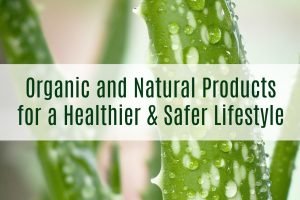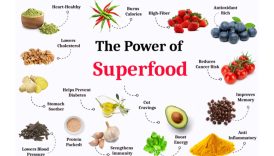Navigating the World of Organic and Natural Products for a Healthier Life

Introduction to Organic and Natural Products
Understanding the Difference
When it comes to making healthier lifestyle choices, understanding the distinction between organic and natural products is crucial. Organic products are cultivated without synthetic pesticides, herbicides, or genetically modified organisms (GMOs). On the other hand, natural products may not carry the same stringent regulations; they might include non-synthetic ingredients but could still contain additives harmful to health. For instance, while browsing a local market, a shopper might encounter labels like “natural” on sugar-laden juices. In contrast, reaching for a USDA Organic certified beverage ensures that it is made from genuine organic ingredients without harmful chemicals.
- Navigating the World of Organic and Natural Products for a Healthier Life
- Introduction to Organic and Natural Products
- Understanding the Difference
- Benefits for Health
- Importance of Choosing Organic and Natural Products
- Reduced Chemical Exposure
- Environmental Impact
- Certifications and Labels to Look For
- USDA Organic
- Non-GMO Project Verified
- Navigating Organic Food Options
- Fruits and Vegetables
- Grains and Legumes
- Exploring Natural Beauty and Personal Care Products
- Skincare
- Haircare
- Making Informed Choices in Household Products
- Cleaning Supplies
- Home Fragrances
- Incorporating Organic and Natural Products into Your Lifestyle
- Meal Planning
- Lifestyle Changes
- Budget-Friendly Tips for Purchasing Organic and Natural Products
- Buying in Bulk
- DIY Alternatives
- Addressing Common Misconceptions About Organic and Natural Products
- Price vs. Value
- Effectiveness
- Conclusion: Embracing a Healthier Life with Organic and Natural Products
- Reflecting on the Journey
Benefits for Health
Choosing organic and natural products can significantly impact overall health. Here are some benefits worth noting:
- Reduced Chemical Intake: Lower exposure to harmful pesticides and additives.
- Nutritional Value: Many studies suggest organic foods may have higher antioxidant content.
- Taste: Many people find organic fruits and vegetables taste fresher and fuller.
By opting for organic and natural products, individuals are not only nurturing their bodies but also supporting sustainable farming practices and promoting a healthier environment.
Importance of Choosing Organic and Natural Products
Reduced Chemical Exposure
Continuing the journey of adopting organic and natural products, one of the most compelling reasons is the significant reduction in chemical exposure. Many conventional farming methods utilize synthetic pesticides and fertilizers, which, while effective for crop yields, may leave harmful residues on food. Choosing organic options can help shield you and your family from these potential hazards. For instance, a family might decide to switch to organic apples after learning that conventional apples are among the most contaminated fruits. By making this choice, they could greatly diminish their intake of harmful chemicals that could affect their health over time.
Environmental Impact
The benefits of choosing organic and natural products extend beyond individual health; they play a vital role in fostering a healthier planet. Organic farming practices prioritize sustainability by:
- Enhancing Soil Fertility: Utilizing natural compost and crop rotations enhances soil health.
- Biodiversity Conservation: Organic farms support a variety of species, thereby maintaining biodiversity.
- Water Protection: Without harmful chemicals, organic farming reduces water pollution and supports clean waterways.
By opting for organic and natural products, consumers contribute to a more sustainable future for both their families and the environment. Each purchase becomes a vote for practices that protect our planet.
Certifications and Labels to Look For
USDA Organic
As consumers delve deeper into the world of organic products, understanding the certifications and labels is vital in making informed choices. One of the most recognized symbols is the USDA Organic seal. This certification indicates that a product meets strict standards set forth by the United States Department of Agriculture, ensuring it contains at least 95% organic ingredients. Imagine you’re at the grocery store, eyeing two jars of pasta sauce. One proudly displays the USDA Organic label, while the other does not. Choosing the organic option means selecting a product free from synthetic preservatives and pesticides, offering peace of mind about what you’re putting on your table.
Non-GMO Project Verified
Another crucial label to look for is the Non-GMO Project Verified mark. This certification guarantees that the product has been tested and independently verified to be free from genetically modified organisms (GMOs). Here’s why this matters:
- Health Assurance: It helps consumers avoid potential health risks associated with GMOs.
- Transparency: It promotes transparency in food production, allowing more informed purchasing decisions.
When browsing the aisles for snacks or cereals, keeping an eye out for the Non-GMO Project Verified label can lead to healthier, more conscious choices. By understanding these certifications, individuals bolster their commitment to health and sustainability.
Navigating Organic Food Options
Fruits and Vegetables
Having discovered the importance of certifications, it’s time to explore how to navigate organic food options, starting with fruits and vegetables. Organic produce is recognizable by its vibrant colors and robust flavors, which often surpass their conventional counterparts. When choosing organic fruits and vegetables, here are some tips:
- Seasonal Selections: Opt for seasonal produce to ensure freshness and better taste.
- Dirty Dozen List: Focus on buying organic for items typically high in pesticide residues, like strawberries and spinach.
- Local Farmers’ Markets: These are great places to find freshly harvested organic options while also supporting local agriculture.
Imagine biting into a crisp organic apple, knowing it’s free from harmful chemicals—an experience that’s not only delightful but reassuring.
Grains and Legumes
Next up are grains and legumes, essential components of a balanced diet. Organic grains, like rice, quinoa, and oats, are cultivated without synthetic fertilizers or pesticides, making them a healthier choice. When selecting organic grains and legumes, consider the following:
- Whole Grains: Look for options labeled “whole grain” to maximize fiber intake.
- Label Check: Verify organic certifications to ensure the absence of GMOs and harmful additives.
Using organic lentils in a hearty soup not only nourishes your body but also supports sustainable farming practices. By incorporating organic fruits, vegetables, grains, and legumes into daily meals, you can enjoy a delicious and health-focused lifestyle.
Exploring Natural Beauty and Personal Care Products
Skincare
Transitioning from thoughtful food choices, it’s equally crucial to consider what goes on your skin. The skincare industry is flooded with products promising miraculous results, but many contain harsh chemicals. By opting for natural skincare products, individuals can nurture their skin without the worry of irritation or harmful side effects. When exploring natural skincare, keep in mind:
- Ingredient Awareness: Look for products with recognizable ingredients like coconut oil, shea butter, and aloe vera.
- Avoid Artificial Fragrances: Choose fragrance-free options or those scented with essential oils to minimize skin irritation.
- Patch Test: Always conduct a patch test when trying new products to avoid adverse reactions.
Imagine applying a luscious organic cream infused with botanical extracts that hydrate your skin while smelling like a garden in bloom—pure bliss!
Haircare
Shifting focus to haircare, natural products can work wonders without the sulfates and parabens common in conventional shampoos and conditioners. Switching to natural haircare means embracing your hair’s natural beauty. Here are some tips to consider for choosing organic haircare:
- DIY Treatments: Try homemade hair masks with ingredients like avocado and honey for deep conditioning.
- Gentle Cleansing: Choose sulfate-free shampoos to cleanse without stripping hair of natural oils.
- Scalp Health: Look for products containing tea tree oil or rosemary to promote a healthy scalp.
Imagine lathering your hair with a creamy, organic shampoo that leaves your locks feeling soft and revitalized, enhancing your natural shine and charm. By exploring natural beauty and personal care products, you cultivate a holistic approach to self-care that celebrates both health and beauty.
Making Informed Choices in Household Products
Cleaning Supplies
As consumers shift to organic beauty and personal care, it’s equally important to scrutinize household products, starting with cleaning supplies. Many conventional cleaners are loaded with harsh chemicals that may pose risks to health and the environment. Transitioning to natural cleaning supplies not only promotes a safer home but also contributes to a more sustainable lifestyle. When choosing cleaning products, consider these tips:
- Check Labels: Opt for brands that use plant-based ingredients and avoid toxic substances like phosphates and chlorine.
- DIY Cleaners: Create effective cleaning solutions at home using vinegar, baking soda, and essential oils. For instance, a simple vinegar and water mix works wonders on glass surfaces!
- Eco-Friendly Brands: Support companies that prioritize sustainability and eco-friendly packaging.
Imagine the satisfaction of wiping down surfaces with a homemade cleaner that smells like lemon and lavender, leaving your space fresh and invigorating.
Home Fragrances
Similarly, home fragrances deserve attention. Traditional air fresheners and scented candles often contain synthetic fragrances and chemicals that can trigger allergies or respiratory issues. Opting for natural alternatives promotes a healthier indoor environment. Here are a few suggestions for choosing home fragrances:
- Essential Oils: Use essential oils in a diffuser to customize your home’s scent without harmful additives.
- Soy Candles: Choose candles made from natural waxes, like soy or beeswax, which burn cleaner and last longer.
- Herbal Sachets: Consider placing sachets filled with dried herbs like lavender or rose in drawers and closets for a subtle, natural aroma.
Imagine coming home to a cozy ambiance filled with the warm, inviting scent of eucalyptus and citrus, ensuring both comfort and health. By making informed choices in household products, individuals can create a safe and pleasant living space for themselves and their families.
Incorporating Organic and Natural Products into Your Lifestyle
Meal Planning
Having explored the significance of choosing safe household products, it’s time to consider how to incorporate organic and natural products seamlessly into daily life, starting with meal planning. Strategic meal planning not only supports personal health but also reduces waste, making the transition smoother and more enjoyable. Here are some practical tips:
- Create a Weekly Menu: Outline meals for the week, highlighting organic fruits, vegetables, and proteins you want to include.
- Shop Seasonally: Visit local farmers’ markets to discover what’s fresh and in season; this not only supports local agriculture but also ensures you’re getting the best flavors.
- Batch Cooking: Prepare meals in bulk using organic ingredients on weekends, saving time and energy during busy weekdays.
Imagine ending your day with a homemade stir-fry, brimming with vibrant organic veggies, that you prepared over the weekend.
Lifestyle Changes
Beyond meal planning, incorporating organic and natural products into your lifestyle often involves making broader lifestyle changes. Here are some actionable steps you can take:
- Embrace Minimalism: Declutter your living space and reduce consumption to focus on quality products that are organic and sustainable.
- Educate Yourself: Stay informed about new organic options in your community by following local farms and brands on social media.
- Engage in Community: Join or form groups that share similar goals for healthy living, whether it’s organic gardening, cooking classes, or eco-friendly workshops.
Imagine the sense of community and accountability that forming these connections brings, alongside the tangible benefits of a healthier life. By integrating these strategies into daily routines, individuals are not just improving personal health but actively supporting a culture of sustainability and awareness.
Budget-Friendly Tips for Purchasing Organic and Natural Products
Buying in Bulk
While incorporating organic and natural products into everyday life brings numerous benefits, budget considerations can be a hurdle for many. However, one excellent way to cut costs without sacrificing quality is by buying in bulk. Purchasing larger quantities not only reduces packaging waste but often translates to significant savings. Here are some tips for buying in bulk effectively:
- Shop at Co-ops or Bulk Stores: These often have lower prices for organic grains, nuts, and snacks.
- Join a Buying Club: Collaborate with friends or family to purchase bulk items together, sharing costs and reducing excess.
- Plan Ahead: Stock up on pantry staples during sales, ensuring you have enough for future meals.
Imagine the satisfaction of filling a reusable container with organic oats and nuts for a fraction of the price, ready to fuel your mornings with wholesome energy.
DIY Alternatives
Another fantastic way to maintain a budget while embracing organic and natural products is to consider DIY alternatives. Many everyday items can be easily made at home, saving money and cutting out harmful additives. Consider these DIY ideas:
- Natural Cleaning Solutions: Homemade cleaners using vinegar, baking soda, and essential oils can be incredibly effective and cost-efficient.
- Skincare Recipes: Simple face masks from ingredients like honey and yogurt can provide pampering without the premium price tag.
- Herbal Teas: Create your own blends using dried herbs and fruits, ensuring you know exactly what goes into your drinks.
Imagine whipping up a gentle exfoliating scrub in your kitchen, knowing that every ingredient is natural and kind to your skin. By exploring bulk purchases and DIY projects, individuals can enjoy the benefits of organic living without stretching their budgets.
Addressing Common Misconceptions About Organic and Natural Products
Price vs. Value
As individuals weigh the decision to incorporate organic and natural products into their lives, one prevalent misconception revolves around the perceived price versus actual value. Many consumers hesitate to spend more on organic items, believing they simply cannot justify the higher cost. However, it’s essential to look beyond the initial price tag and consider the long-term benefits. For instance:
- Health Benefits: Investing in organic foods reduces exposure to harmful chemicals, potentially lowering healthcare costs in the future.
- Quality Ingredients: Organic products often contain fewer additives, enhancing both flavor and nutritional integrity.
- Supporting Sustainability: Purchasing organic supports environmentally-friendly farming practices, contributing to a healthier planet.
Imagine preparing a rich, organic meal, knowing that each ingredient nurtures both your body and the earth. That satisfaction is worth the investment.
Effectiveness
Another common myth centers around the effectiveness of organic and natural products. Some people question whether these alternatives can truly compete with conventional items regarding cleaning power, skincare results, or food quality. However, many find that organic and natural options often perform just as well, if not better. Consider the following:
- Ingredients Matter: Natural cleaning products made with vinegar and baking soda are often just as effective at cutting grease as their chemical counterparts.
- Skin Compatibility: Organic skincare products with fewer synthetic ingredients tend to be gentler and more effective for sensitive skin.
- Taste and Freshness: Many people notice that organic produce often has richer flavors and better freshness than conventional options.
Picture savoring a meal prepared with organic ingredients bursting with flavor, all while knowing you’ve chosen products that are not only effective but also good for your body and the environment. Addressing these misconceptions helps empower consumers to make informed choices that enhance their lifestyle.
Conclusion: Embracing a Healthier Life with Organic and Natural Products
As we wrap up this exploration of organic and natural products, it’s clear that integrating them into daily life can lead to profound benefits for both health and the environment. By addressing common misconceptions and focusing on the value these products offer, individuals can make informed choices that align with their wellness goals.
Reflecting on the Journey
Transitioning to an organic lifestyle doesn’t happen overnight, and that’s perfectly okay. Here are some final thoughts to keep in mind:
- Start Small: Begin by swapping out a few everyday items for organic alternatives and gradually expand from there.
- Stay Informed: Continuously educate yourself about organic products, their benefits, and innovative DIY solutions.
- Celebrate Progress: Embrace each step you take towards a healthier lifestyle—whether it’s meal planning or choosing a natural skincare routine.
Imagine the collective impact of individual efforts—creating healthier households and nurturing a more sustainable planet. By embracing organic and natural products, you’re not just investing in your health but also contributing to a brighter future for generations to come. It’s a journey worth embarking on, one mindful choice at a time.



